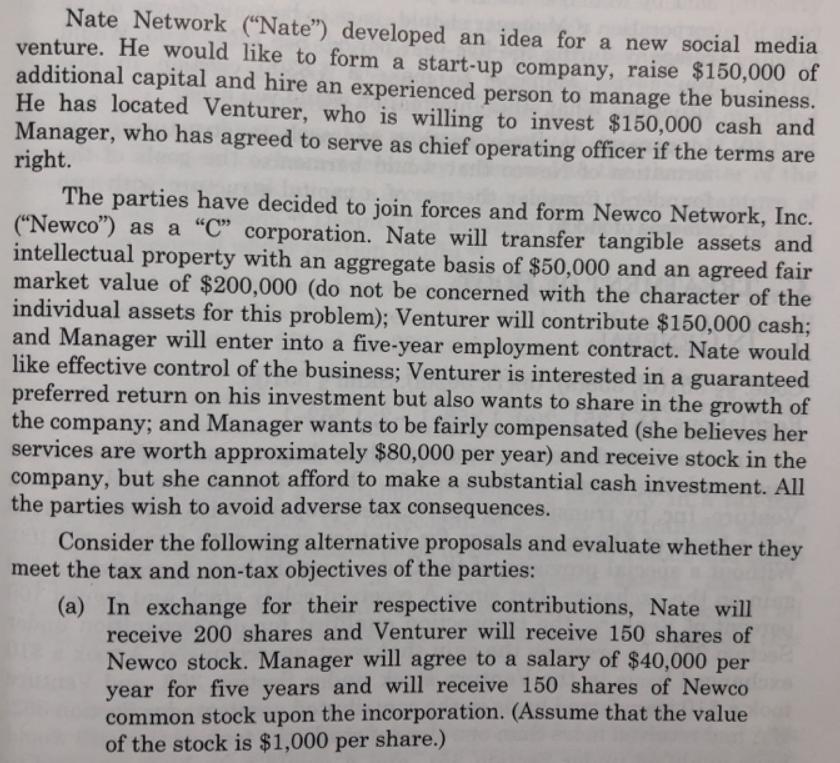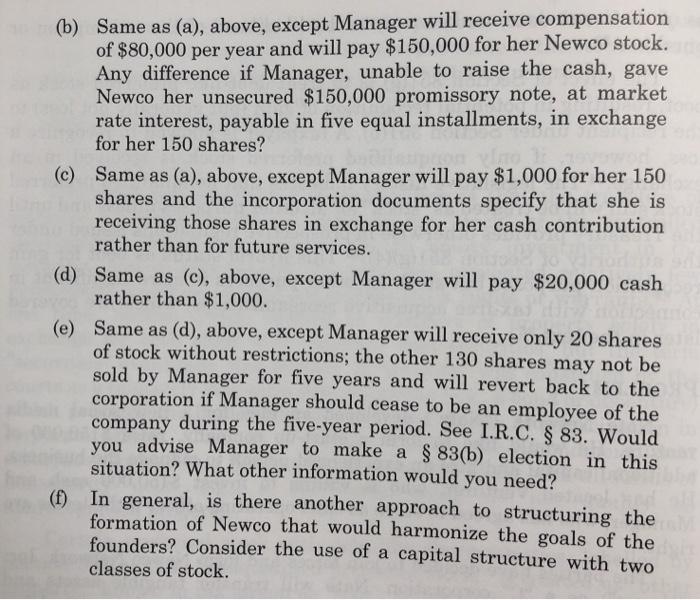Question: Nate Network (Nate) developed an idea for a new social media venture. He would like to form a start-up company, raise $150,000 of additional


Nate Network ("Nate") developed an idea for a new social media venture. He would like to form a start-up company, raise $150,000 of additional capital and hire an experienced person to manage the business. He has located Venturer, who is willing to invest $150,000 cash and Manager, who has agreed to serve as chief operating officer if the terms are right. The parties have decided to join forces and form Newco Network, Inc. ("Newco") as a "C" corporation. Nate will transfer tangible assets and intellectual property with an aggregate basis of $50,000 and an agreed fair market value of $200,000 (do not be concerned with the character of the individual assets for this problem); Venturer will contribute $150,000 cash; and Manager will enter into a five-year employment contract. Nate would like effective control of the business; Venturer is interested in a guaranteed preferred return on his investment but also wants to share in the growth of the company; and Manager wants to be fairly compensated (she believes her services are worth approximately $80,000 per year) and receive stock in the company, but she cannot afford to make a substantial cash investment. All the parties wish to avoid adverse tax consequences. Consider the following alternative proposals and evaluate whether they meet the tax and non-tax objectives of the parties: (a) In exchange for their respective contributions, Nate will receive 200 shares and Venturer will receive 150 shares of Newco stock. Manager will agree to a salary of $40,000 per year for five years and will receive 150 shares of Newco common stock upon the incorporation. (Assume that the value of the stock is $1,000 per share.) (b) Same as (a), above, except Manager will receive compensation of $80,000 per year and will pay $150,000 for her Newco stock. Any difference if Manager, unable to raise the cash, gave Newco her unsecured $150,000 promissory note, at market rate interest, payable in five equal installments, in exchange for her 150 shares? (c) Same as (a), above, except Manager will pay $1,000 for her 150 shares and the incorporation documents specify that she is receiving those shares in exchange for her cash contribution rather than for future services. (d) Same as (c), above, except Manager will pay $20,000 cash rather than $1,000. (e) Same as (d), above, except Manager will receive only 20 shares of stock without restrictions; the other 130 shares may not be sold by Manager for five years and will revert back to the corporation if Manager should cease to be an employee of the company during the five-year period. See I.R.C. 83. Would you advise Manager to make a 83(b) election in this situation? What other information would you need? In general, is there another approach to structuring the (f) formation of Newco that would harmonize the goals of the founders? Consider the use of a capital structure with two classes of stock.
Step by Step Solution
3.37 Rating (153 Votes )
There are 3 Steps involved in it

Get step-by-step solutions from verified subject matter experts


